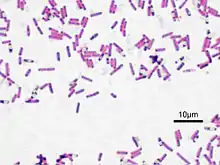Bacillus
Bacillus is a genus of rod shaped bacteria. They are Gram-positive, meaning they have an extra outside cell layer.
| Bacillus | |
|---|---|
 | |
| Bacillus subtilis, Gram stained | |
| Scientific classification | |
| Domain: | |
| Division: | |
| Class: | |
| Order: | |
| Family: | Bacillaceae |
| Genus: | Bacillus Cohn, 1872 |
Bacilli are partly or wholly aerobic. They do aerobic respiration. They are every where in nature. Bacillus includes both free-living (non-parasitic) and parasitic pathogenic species.[1]
Under stressful conditions, they produce endospores. These are not true spores, but like survival pods they can stay in a dormant state for long periods.
Some species of Bacillus are worth noting:
- Bacillus anthracis, which causes Anthrax.
- Bacillus subtilis is considered an model organism. It is often used in genetic engineering.[2]
- Bacillus cereus which is responsible for a form of food poisoning.
- Bacillus thuringensis which is used in pest control. It produces a toxin which can kill some moths, and certain butterflies.
 Bacillus antracis
Bacillus antracis Bacillus subtilis
Bacillus subtilis Bacillus cereus
Bacillus cereus
Related pages
References
This article is issued from Wikipedia. The text is licensed under Creative Commons - Attribution - Sharealike. Additional terms may apply for the media files.